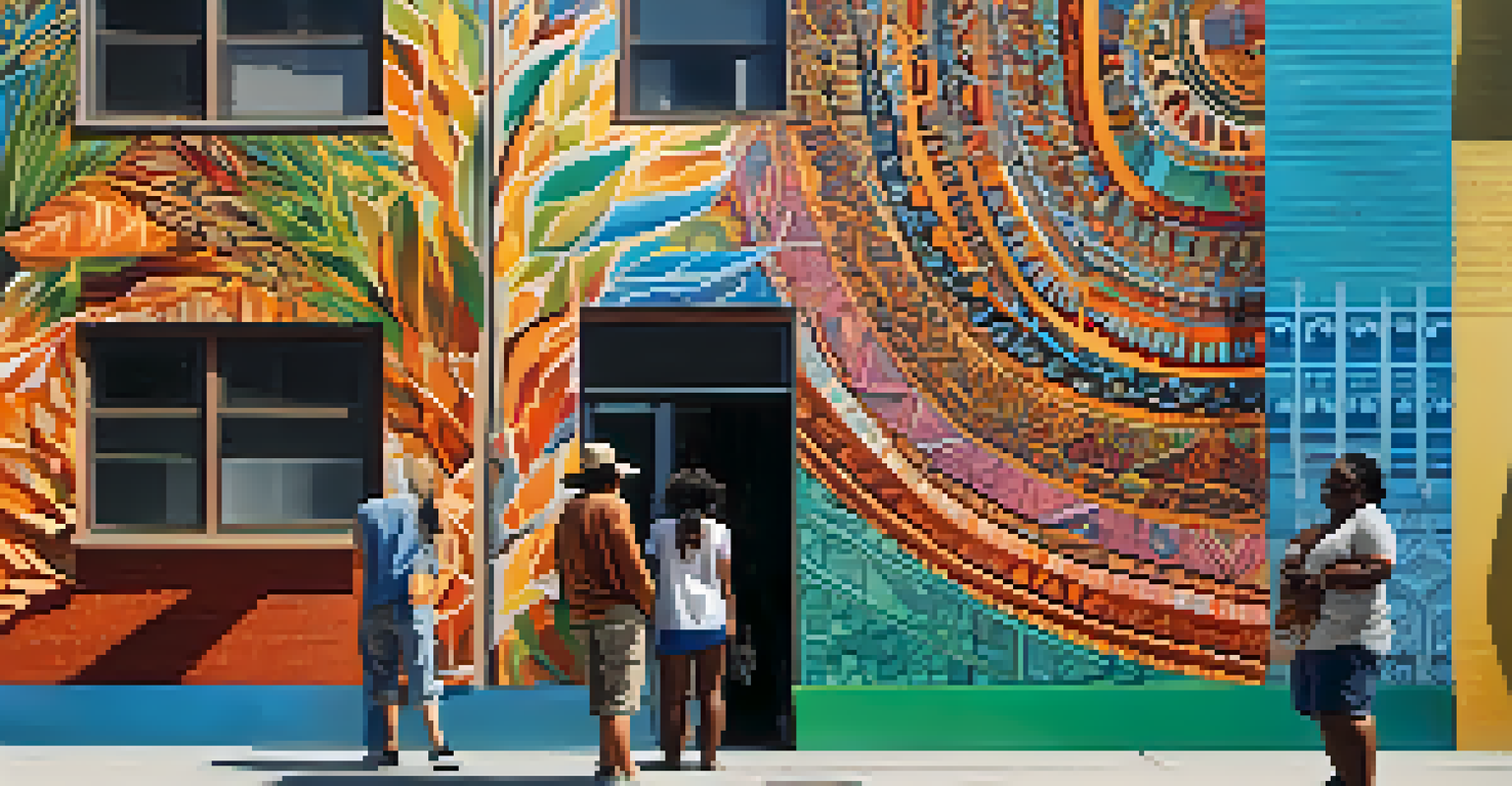Benefits of Cultural Exchange Programs for Local Communities

Cultural Exchange Programs Foster Understanding and Tolerance
Cultural exchange programs serve as a bridge between diverse populations, allowing participants to experience different cultures firsthand. By living and interacting with people from various backgrounds, individuals gain insights that challenge stereotypes and promote empathy. This shared understanding creates a more tolerant community where differences are celebrated rather than feared.
Cultural exchange is not just a matter of learning about other cultures; it's about building bridges of understanding and friendship.
Imagine a local family hosting an international student; their home becomes a melting pot of traditions, stories, and culinary delights. As they share meals and customs, both the host family and the student develop a deeper appreciation for each other's way of life. Such interactions can transform perceptions and reduce prejudice, ultimately leading to a more harmonious society.
Moreover, when communities embrace intercultural experiences, they often witness a ripple effect. The lessons learned through exchange programs can inspire local residents to engage in their own cultural explorations, fostering an environment where curiosity thrives and inclusivity is the norm.
Economic Growth Through Cultural Exchange Initiatives
Cultural exchange programs can significantly boost local economies by attracting tourists and fostering new business opportunities. When international participants visit, they contribute to the local economy by spending on accommodations, food, and entertainment. This influx of visitors not only supports local businesses but also creates jobs, leading to a win-win situation for everyone involved.

For instance, a town that hosts an annual cultural festival might see an increase in visitors from around the world, eager to experience local art, music, and cuisine. This not only elevates the town's profile but also encourages local artisans and entrepreneurs to showcase their talents, driving economic activity in the area.
Cultural Exchange Builds Understanding
Cultural exchange programs foster empathy and tolerance by allowing participants to experience and celebrate diverse backgrounds.
In addition, the collaboration between local entrepreneurs and foreign visitors can lead to innovative business ideas and partnerships. When diverse perspectives come together, they often spark creativity, resulting in unique products and services that can appeal to a wider audience.
Enhancing Education Through Global Perspectives
Cultural exchange programs enrich educational experiences by introducing students to global perspectives. When learners interact with peers from different countries, they gain insights that complement their academic studies, making lessons more relatable and impactful. This exposure encourages critical thinking and broadens their understanding of the world.
The beauty of cultural exchange lies in the shared experiences that enrich our lives and foster a sense of community.
Consider a classroom where students engage in virtual exchanges with their counterparts in another country. They might collaborate on projects, share cultural artifacts, or discuss historical events from multiple viewpoints. These interactions not only make learning more dynamic but also prepare students to navigate an increasingly interconnected world.
Furthermore, educators who participate in cultural exchange programs often bring back innovative teaching methods and resources. By integrating these fresh ideas into their curriculum, they can inspire students to think creatively and appreciate the value of diverse perspectives.
Strengthening Community Bonds Through Shared Experiences
Cultural exchange programs create opportunities for local residents to connect and collaborate on shared experiences. Whether it’s through volunteering, hosting events, or participating in workshops, these interactions foster a sense of belonging and community pride. When people come together to celebrate cultural diversity, the bonds they form are often lifelong.
For example, a community might organize a potluck where residents and exchange participants share traditional dishes from their cultures. This not only allows for a delightful culinary experience but also opens doors for conversations and friendships that transcend cultural boundaries. These shared moments can strengthen the fabric of the community.
Economic Growth Through Tourism
These initiatives boost local economies by attracting international visitors who contribute to spending and job creation.
Moreover, as people engage in cultural exchange, they often develop a greater commitment to their community. The desire to learn from others can inspire individuals to take an active role in community initiatives, leading to a more vibrant and cohesive environment.
Promoting Art and Creativity Through Cultural Exchange
Cultural exchange programs often lead to a flourishing of the arts within local communities. When artists from different backgrounds come together, they share unique techniques, styles, and inspirations that can invigorate the local art scene. This exchange of ideas can result in innovative art forms that reflect a blend of cultural influences.
Think of a local mural painted by artists from various countries, each contributing their style and perspective. The finished piece becomes a visual representation of collaboration and diversity, drawing interest from residents and visitors alike. Such projects not only beautify the community but also create lasting legacies.
Furthermore, art workshops and performances that involve exchange participants can encourage local talent to explore new mediums and narratives. This inclusive environment nurtures creativity and can pave the way for future artistic endeavors that resonate on both local and global stages.
Health Benefits of Cultural Exchange for Community Well-Being
Participating in cultural exchange programs can enhance the mental and emotional well-being of community members. Engaging with diverse cultures promotes social connections, which are vital for overall health. The friendships formed during these exchanges can provide support networks that enrich individuals' lives.
For instance, a community group that organizes cultural exchange activities often sees participants reporting higher levels of happiness and satisfaction. The joy of learning about different cultures and making new friends can reduce feelings of isolation and loneliness, fostering a healthier community.
Global Citizenship and Responsibility
Participants in cultural exchange programs develop a sense of global citizenship, motivating them to advocate for positive community changes.
Moreover, many cultural exchange programs include activities focused on wellness, such as dance, yoga, or cooking classes that emphasize healthy living. These initiatives not only promote physical health but also encourage participants to adopt holistic approaches to well-being that they can share with their communities.
Building Global Citizenship Through Cultural Exchange
Cultural exchange programs instill a sense of global citizenship among participants, encouraging them to think beyond their immediate surroundings. As individuals learn about different cultures and global issues, they develop a greater sense of responsibility toward the world. This awareness can inspire them to become advocates for positive change in their communities and beyond.
Consider young people who participate in exchange programs; they often return home with a newfound understanding of global challenges such as climate change or social justice. Armed with this knowledge, they may lead initiatives that promote sustainability or inclusivity within their own communities.

Furthermore, as communities embrace this spirit of global citizenship, they cultivate environments where social responsibility and community engagement are prioritized. This shift not only benefits local residents but also contributes positively to the wider world.
Sustaining Cultural Exchange Programs for Long-Term Benefits
To maximize the benefits of cultural exchange programs, it's essential to ensure their sustainability. Communities must actively support and invest in these initiatives to continue reaping their rewards. This can involve securing funding, fostering partnerships, and engaging local stakeholders in the planning process.
For example, a town that has successfully hosted cultural exchange programs might establish a dedicated committee to oversee future initiatives. By involving community members in the decision-making process, they can align programs with local needs and interests, ensuring their relevance and impact.
Additionally, sharing success stories and outcomes from cultural exchange programs can inspire more people to get involved. Highlighting the positive changes and connections forged through these initiatives can motivate others to participate, creating a self-sustaining cycle of cultural enrichment.